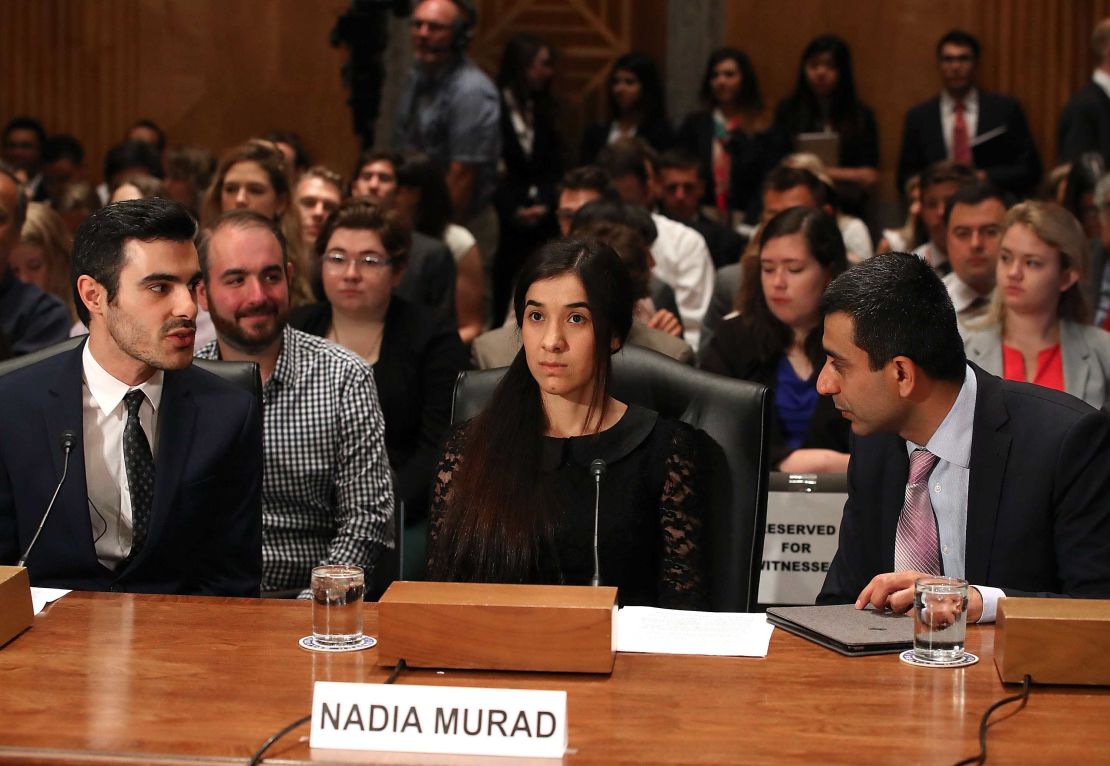On the day when a woman – and a former ISIS slave – won a Nobel Peace Prize …
In a week when survivors are coming forward after years of being scared into silence …
On the one-year anniversary of a staggering New York Times investigation that jolted the #MeToo movement and toppled a Hollywood mogul …
Senators are on the verge of deciding if a man accused of sexual assault will sit on the US Supreme Court.
Seventy-seven men and 23 women – 51 Republicans and 49 Democrats – are set to vote Saturday in the Senate on whether to confirm Brett Kavanaugh’s nomination.
We don’t know exactly when they will, but Sen. Susan Collins’ revelation Friday afternoon that she’d cast her vote in support of Kavanaugh marked a tipping point, giving the nominee the number of votes he needs to clear the final hurdle.

Last week’s day of gut-wrenching testimony had us glued to our screens. And today’s frenzy as a key decision looms on Capitol Hill is spinning across our Twitter timelines and spilling out into the streets.
No matter where you stand, the timing of it all makes today stand out.
A prize for crusaders against sexual violence
ISIS militants overran Nadia Murad’s village in northern Iraq when she was just a high school student. On Friday the 25-year-old became a joint winner of the Nobel Peace Prize for her efforts to end the use of sexual violence as a weapon of war and armed conflict.
She shares the honor with Denis Mukwege, a doctor who’s worked to treat thousands of women and girls affected by rape and sexual violence in the Democratic of Congo.
Unlike some past winners of the prestigious award, such as Nelson Mandela or Malala Yousafzai, Murad isn’t a global household name. But she’s become an increasingly high-profile voice. She has used her traumatic experience – kidnapped, enslaved and raped by ISIS fighters – to become an advocate for the Yazidi minority in Iraq and to fight for the rights of women and refugees.

The Nobel committee chair said Murad had “shown uncommon courage in recounting her own sufferings and speaking up on behalf of other victims.”
Murad was in Cambridge, Massachusetts, when she learned she had won the prize. “I hope that it will help bring justice for those women who suffered from sexual violence,” she told a Nobel official.
A reminder of what a difference a year can make
A year ago, New York Times reporters and editors crowded around a computer screen and prepared to publish an investigation that sent shockwaves through Hollywood and around the world.
The explosive allegations toppled the career of an Oscar-winning producer. Harvey Weinstein faces six sex crime charges in New York, including two counts of rape. He has pleaded not guilty and through a representative he’s repeatedly denied “any allegations of nonconsensual sex.”
“The stories about Weinstein’s alleged mistreatment snowballed into a movement against abuse that reverberated across industries,” CNN’s Sandra Gonzalez, Lisa Respers France and Chloe Melas note. “Thousands of people have raised their voices to say, ‘me too.’ Dozens of once powerful men – from celebrities to political figures – have been held accountable for mistreatment. Many continue to vehemently fight charges of misconduct.”
And another #MeToo moment
Now a new wave of survivors are coming forward – some saying they were spurred by Christine Blasey Ford’s testimony before the Senate Judiciary Committee to share their stories for the first time.
Protesters packed into a Senate building Thursday as activists descended on Capitol Hill while lawmakers weighed their next steps. Hundreds were arrested, including several celebrities who joined their ranks.

What happens next is up to the US Senate. Its decision will shape the days and weeks ahead – including the midterm elections – and possibly generations to come.
We’ve reached what CNN’s Stephen Collinson describes as a “day of fury and mistrust,” playing out in the halls of power and on the streets.
CNN’s Laura Smith-Spark and journalist Lianne Kolirin contributed to this report.

